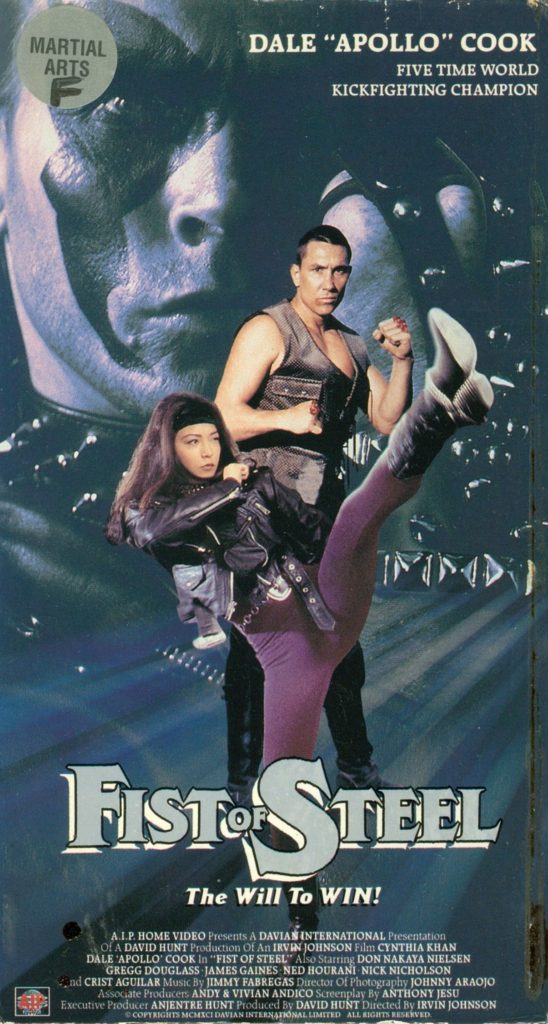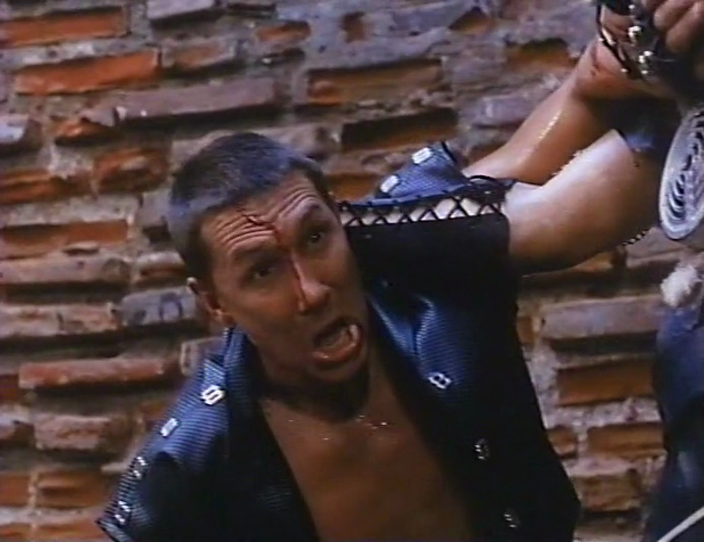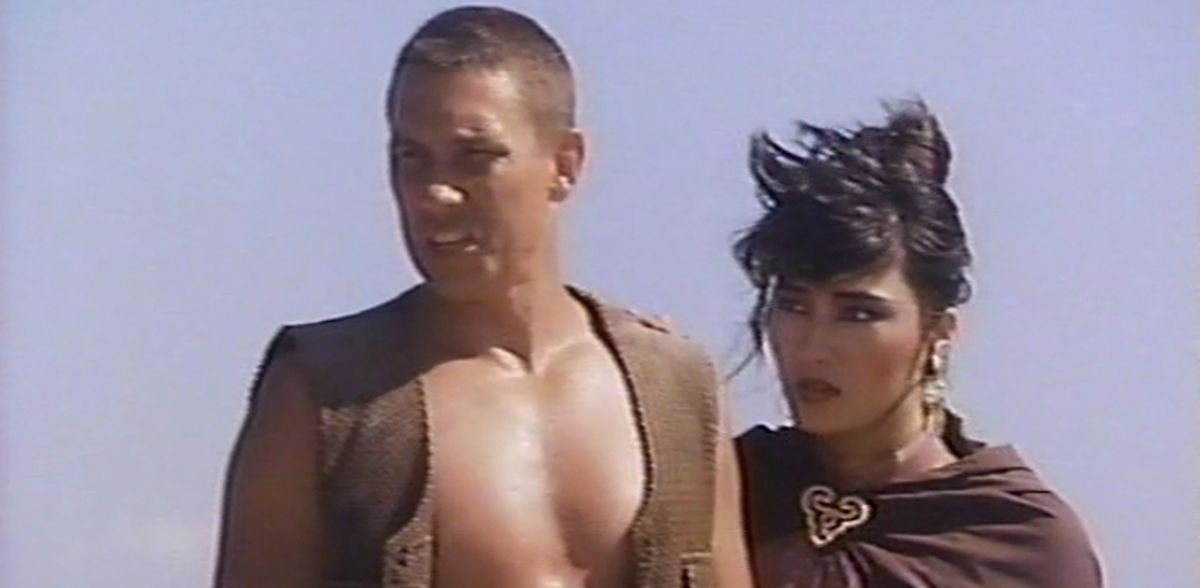The Incredibly Bad Film Show
Fist of Steel: “This world is too full of shit to be weak.”
There’s a key difference between American fight flicks and their Oriental cousins: the Western versions lead with martial artists trying to act, while most Hong Kong action stars are first and foremost actors, with fighting skills secondary. The latter approach makes more sense: what you see in a kung-fu film bears the same relationship to tournament fighting, that a porn flick does to real sex. The ability to beat someone up in ten seconds, while impressive, is irrelevant when stunt doubles and sharp editing can make anyone a decent fighter — it’s much harder to shoot round a crap actor. Thus, almost by definition, any Hollywood martial arts movie is a Bad Film: discerning buffs sit up and take notice when the major star of a film has “American middleweight kickboxing champion” tacked onto his credit, as this basically translates to “we apologise for his total lack of acting ability”. Unfortunately, such deficiencies rarely suffice to make the films incredibly bad: few build on the non-acting (or amazingly, even notice it), and plod along lines that were hackneyed when Bruce Lee was still a lad.

‘Fist of Steel’ looks like it was made by a gang of mates over a weekend in the Arizona desert. While undeniably awful, for the above reason, it has definite charm: like that time at school you managed to produce something in Art — by exterior standards, it still wasn’t very good, but you were proud of it, and could appreciate that, for once, Something Had Clicked.
So it is with FoS. The whole is more than the sum of the parts — unless one of the parts is “beer”. This is the kind of movie necessarily preceded by a trip to the off-licence, as steady alcohol input infinitely enhances its pleasures. Diet Pepsi will not do: sober, you won’t achieve oneness with the director, able to second guess what’s about to happen. Now, our beer-fuelled idea of “cool” is so warped that, even in cult films, the director will usually wimp out. But FoS had an unerring knack of getting it right, to growing applause from the living room. audience.
The sole reason for acquiring this film was that it starred fave HK action-actress Cynthia Khan. Ten minutes in, I regretted my hasty purchase, despite a fondness for movies set after the apocalypse (or at least, after the stock-footage-of-60’s-nuclear-tests). For stealing Lyssa (Khan), hero Amp (Dale ‘Apollo’ Cook) is staked out by gladatorial rival Mainframe (Gregg Douglass), and Lyssa herself, to my shock, was offed. A sinking feeling, tied with the discovery that the front cover depicted a piss-poor Cynthia lookalike, told me I’d been sold a cameo, filmed while Cynthia was delayed at LA airport on her way back to Hong Kong. The prospect of 85 more minutes of Dale ‘Apollo’ Cook’s non-acting was terrifying, especially as he looked like Harrison Ford on a bad hair day, circa ‘Regarding Henry’.
Fortunately, things started to perk up after he breaks free, to be rescued by a desert-living tribe of pacifists including the unfortunately name “Wind” (Cynthia Khan again — hooray!). Living by the tenets of “The Book” — it’s never actually named, but no prizes for guessing which religious text talks about “loving thy neighbour” – they grudgingly fix Amp up, then insist he leaves. When he does, Wind follows, dressed in a natty canary-yellow lounge suit, doing her best ‘lost puppy’ impression. After a day of this he decides, unsurprisingly, to return her to her clan, only to find that, in the tradition of pacifists in martial arts movies, they’ve been slaughtered. Mainframe’s men, discovering Amp is still alive, have taken revenge on the tribe who helped him.

Here Wind enters “you killed my family and you must pay” mode, and literally throws away The Book, though she could have hung onto the Old Testament, which I seem to recall being pretty keen on “an eye for an eye”, etc. Her pacifist philosophy is totally destroyed when she’s nearly mugged by a beggar. Only Amp’s intervention saves her, but it also marked the turning point of the film, from an Incredibly Bad angle. Amp gives the expected lecture on “these people will kill you for one drop of water…toughen up!”, and our reaction was ‘Wouldn’t it be cool if Cynthia kicked the helplessly sprawled beggar?” To our delight & joy, she did. Four times. We sat up and took note: the director was clearly one to respect when it came to fascistic, gratuitous violence.
Amp is back at the bottom as a fighter, in the Beazer Homes League so to speak, reduced to battling for water and gas. [While unlikely to lose Jackie Chan sleep, the fights are plentiful and not bad, especially as most take place on sand-dunes, scarcely solid footing. However, the usage of two sound effects in strict rotation eventually becomes slightly wearing] After a bit, Wind fancies a shot, despite the canary-yellow lounge suit. “It’s gotta go”, we muttered, and lo, during training (CK incidentally looking much better in the flexibility department than DC), the jumpsuit was replaced by a far more aesthetically pleasing black leather number. This responsiveness to audience demand was getting worrying close to interactive cinema.
Her abilities are soon put to good use, when they are attacked by a masked tribe. Who are they? Damned if I know, not until the end credits does it transpire they were apparently a bunch of lepers — yes, lepers. Doing martial arts. No “Flying Fist” jokes, please. Amp kills their leader, which confuses them so much they, er, let Amp and Wind go.

Meanwhile, we bump into Scutter (James Gaines), a figure from Amp’s past, with the scary responsibility of moving the plot on. He reveals this began when Mainframe started gladiatorial death combats: Amp would never kill his opponents and was more popular with the crowd, so Mainframe used Lyssa (remember her? So very long ago now…) as a pretext to get rid of Amp.
Amp gets drunk and randy: “Let’s screw!” he says to Wind, whose response is swift and unchristian. “Guess a blow-job’s out of the question?” counters Amp, which may or may not be a subtle homage to ‘Repo Man’. Speaking of blow jobs — or rather, blow, kick and punch jobs — Amp is also progressing through a competition. It does help that he wields nunchakus, while the poor victim in one bout has an obviously rubber axe. Unsurprisingly with such an edge, he wins, but the tournament promoter, rather than pay out, betrays him to Mainframe’s sidekick Wires (Don Nielsen), whose men have hubcaps on their chests for reasons never satisfactorily explained.
The film now hurtles to its inevitable conclusion with all the subtlety of a runaway juggernaut. Nothing can stop it, no crisis of conscience (“Ever since I met you, my life has changed”. ‘We can just forget about it and leave”), change of heart by Wind regarding the sex thing, or Scutter’s murder by Mainframe. We reach the end-product of the past 80 minutes: climatic battle between Amp, Wind, Mainframe and Wire. I won’t spoil things by revealing who wins — though there’s little inherent in FoS to ‘spoil’. But it springs one last surprise in the end titles, where it’s suddenly revealed to be operating under a pseudonym, and was really called ‘Eternal Fist’. Well, I’ll be damned. But somehow, this just sums up the entire delightfully dumb experience…
